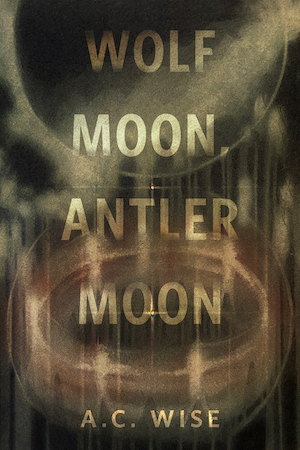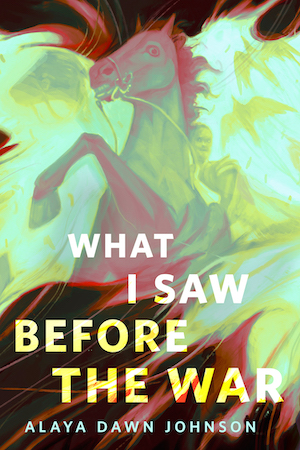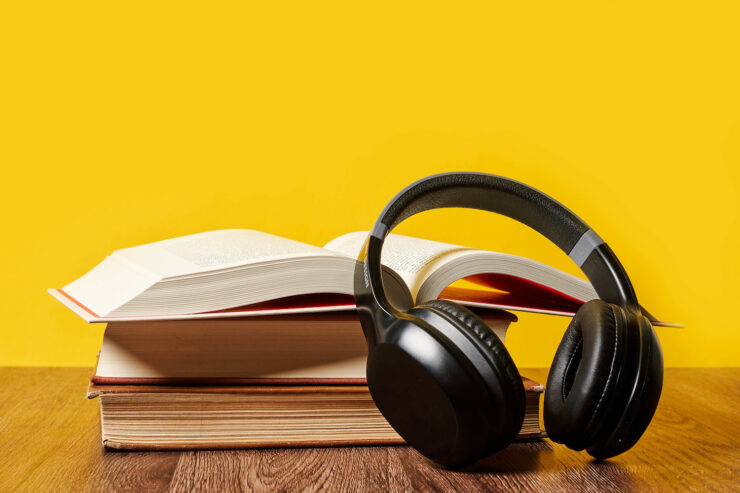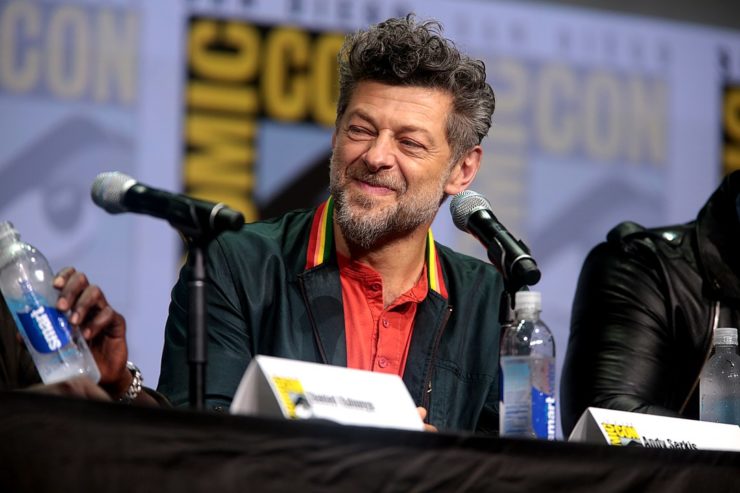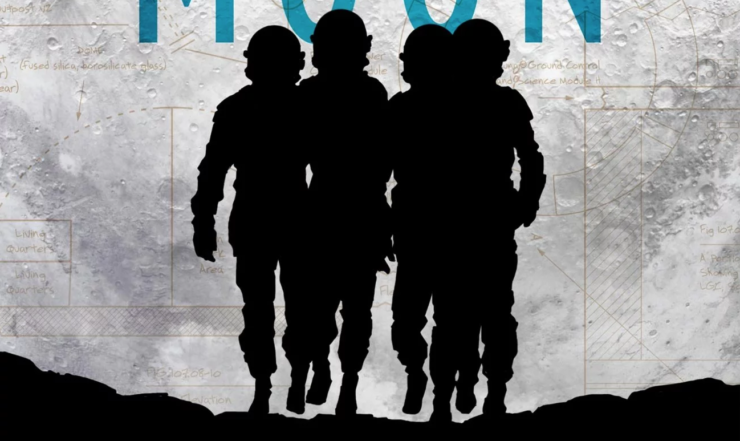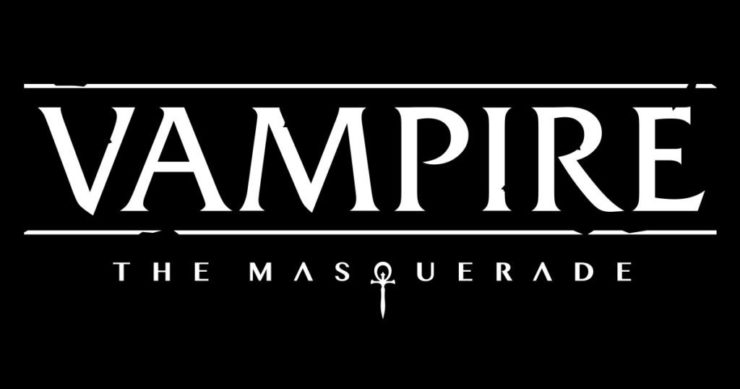I’ve officially become An Audiobook Person. It wasn’t a sudden conversion—I’ve been listening to podcasts for years, but there was a time I couldn’t imagine listening to fiction in the same way. Then I started adding non-fiction audiobooks into the mix in my library queue, and I loved it. It was a whole new world; then at some point, I finally tried listening to a few fiction audiobooks, and… it took some getting used to, honestly. I bounced off of a few attempts, and at first I didn’t like surrendering so much control to the narrator, letting their phrasing and their interpretations of the characters’ voices influence my impressions. It felt a bit like getting the story secondhand, filtered through someone else’s mind, like the mental equivalent of reading somebody’s aggressively highlighted copy with notes scribbled in the margins.
But I did like being able to catch up on reading while I was packed into an overcrowded, standing-only subway car, or making dinner, or going for long walks. The more I listened, the more I got used to it—but also, I learned what works for me and some things that don’t (more on that in a bit), and I started to appreciate what a talented narrator can bring to the experience. I think I started really listening to fiction in earnest in 2015 or so, and now I have favorite series and favorite audiobook narrators, people whose names I’m always happy to see when I’m searching for something to read/listen to.
I know from reading far too many comments on this topic over the years that some points that should probable be addressed upfront. So, first: Everyone is different. Everyone’s brain works differently. I’ve always had very good recall when it comes to remembering conversations and stories—anything that takes the shape of a narrative, really (if you ask me to remember numbers of any sort, forget about it. I can give you song lyrics or Mystery Science Theater quotes all day long, but ask me to come up with a credit card number without digging for my wallet and I’ll just throw a smoke bomb and run away to avoid the awkward silence). The point is, I’ve seen people absolutely insist that listening to a book is Not Reading, and while I recognize that there are differences in the way I’m experiencing a story while out on a hike, say, rather than flipping through a book, it works for me.
In fact, I often feel more immersed and focused on the world of a story when I’m doing mindless or repetitive tasks like knitting, washing dishes, or taking a long walk on a familiar path than when I’m forced to sit and focus on the pages in front of me. I’ve always been someone who works better if I can move around a bit—in meetings, I take notes or doodle while I listen. When I chat on the phone, I can’t stay still—I pace (I was the kid who always got yelled at for stretching the phone cord, back in the Dark Ages when we all had landlines and televisions weighed roughly as much as one Cocaine Bear. It was a magical time.). I have no problem paying attention, but especially now as an adult with a highly sedentary job, when I don’t have to sit still in my off hours, I generally prefer to be in motion, even if it’s just walking around the block or straightening up, watering plants, chasing the cat around—whatever needs doing.
And hell, even when I’m feeling tired or lazy or the weather is overcast and gloomy, the draw of the story is the best enticement I know to get me out of the house…which was a huge help during the worst of the pandemic. I have a lot of hefty fantasy novels to thank for luring me out into the fresh air day after day, which was massively beneficial in terms of mood and mental health during what was not a great time for any of us. It just made everything less bleak.
I know not everyone will experience audiobooks the way I do—even beyond issues of ability and deafness or hearing loss, you may not process or respond to the text in the same way that you would with the written word for any number of reasons. You might just not like it, period. You might prefer quiet time with a book, which is lovely, and you deserve it! Do whatever works for you, and enjoy!
For me—I’ve fallen for audiobooks, and I don’t think I can ever look back. I read (with my eyeballs) all day, every day, mostly on computer screens—emails, news articles, research for essays I’m editing, drafts of new essays, more emails, amazing old articles from The Toast because sometimes I just need to take a break and have a cup of tea and read The Toast. But I don’t really remember the last time I read a paper book or an ebook (at least for pleasure reading only; not every book is easily available in audio form, so of course I read various formats for work-related research). I had my gorgeous hardback copy of The Mirror & The Light all ready to go when it came out in 2020—I’d been waiting for the final volume of the trilogy along with all the other Hilary Mantel nerds, and was so excited to dive in. And then I just…didn’t. I kept “saving” it for a long weekend or holiday break, but it gathered dust until I finally downloaded the audiobook and ripped right through it. (The audiobook is read by the actor Ben Miles, who worked closely with Mantel on the stage adaptation of the first two books, in which he played Cromwell. I was lucky enough to see that version on Broadway, and Miles is absolutely stellar in the role, and as a narrator. Highly recommended, and he reads all three books, if you’re looking to start or reread the trilogy!)
Which brings me to what works for me, along with a few pet peeves. Maybe it’s best to start with things that tend to bug me or take me out of a book. I’m not going to call out any individual titles or narrators here, of course, and will note that of course, this is all very subjective—your mileage may vary, and probably will. That said, I’m not a huge fan of audiobooks in which the voices of children and young people are performed at a much higher register than that of the other characters. This was a problem with one of the first novels I tried to listen to; the narrator would break into a shrill, breathy whine whenever the youngest character spoke, and it was… off-putting. Otherwise, the person narrating did a fine job, but that’s become something of a deal-breaker for me. If the adult narrator goes into a high-pitched squeak or starts channeling Ralph Wiggum every time a younger character speaks, I usually find something else to read.
The same goes for accent work. As with any performance, a lot depends on context and the type of character involved, but sometimes narrators go a bit overboard, or just miss the mark completely. I remember an instance in which an otherwise decent narrator—who happened to be a middle-aged American man—attempted to capture the voice of a streetwise young woman from the UK and somehow ended up sounding like he was starring as the Dowager Countess in some sort of horrifically ill-conceived dinner theater production of Downton Abbey. It just didn’t work, and felt so disruptive—it was difficult to take those sections of the book seriously, as a result.
Finally, there’s the issue of pronunciation, which is a tricky one. Especially when it comes to fiction, and particularly SF and fantasy, where authors invent so much in terms of language, vocabulary, and naming conventions. I’ll admit, sometimes I’m surprised when narrators say character’s names or place names differently from my own mental version, but I’m generally willing to roll with it when it comes to fiction. After all, presumably they have access to the source, or at least might have some guidelines from the author—at least you’d hope so?
Honestly, there’s so much I don’t know about the process of recording audiobooks, and the decisions that go into the production. I understand the basics—this article on “How Audiobooks Get Made” provides a solid primer, if you’re interested!—but I imagine it varies quite a bit, depending on the publisher, producer, and the authors and narrators involved. I always wonder how involved authors get to be, and how closely they work with the narrators of their books—if you have firsthand knowledge or other insights into how the audiobook sausage gets made, please let us know in the comments. (Note: you do not need to use the phrase “audiobook sausage” in your response. In fact, you probably shouldn’t. We can all just pretend that phrase doesn’t exist.)
In any case, in my years of reading audiobooks, the good experiences exponentially outweigh any complaints I might have here and there. I’m always looking for recommendations, so I figured it might help to talk about what I like and tend to look for when I go trawling for new books (which is pretty much whenever I have time to read purely for pleasure). In no particular order, here’s a random assemblage of some things that make my brain happy:
I have a soft spot for memoirs by performers (and particularly comedians) read by the performers themselves—off the top of my head, I’ve really enjoyed books written and read by folks like Tina Fey, Amy Poehler, Quinta Brunson, Eric Idle, Eddie Izzard, Rachel Bloom, and the great Patti LuPone. How To Be Perfect, by Michael Schur, is also a wonderfully special book, an even better audiobook, and a must-read for fans of The Good Place.
I love giant oral histories and journalistic deep dives into the entertainment industry like Live From New York by James Andrew Miller and Tom Shales (narrated by Christina Delaine and Paul Woodson), The Story of “In Living Color” and the Black Comedy Revolution by David Peisner (read by JD Jackson), Alan Sepinwall’s The Revolution Was Televised (read by Joe Ochman), and the amazing fever dream that is James B. Stewart’s DisneyWar (read by Patrick Lawlor). I will read/listen to literally anything by Mark Harris (Pictures at a Revolution, narrated by Lloyd James, is probably my current favorite). I also enjoy gossipy audiobooks about Broadway and musical theater like Michael Riedel’s Razzle Dazzle (I can barely type the title without breaking into involuntary jazz hands—it’s narrated by Peter Berkrot), or more thorough examinations like Jack Viertel’s The Secret Life of the American Musical (which is not so gossipy, but brilliant, and read by David Pittu).
When it comes to fiction…I mean, I don’t know where to start, since I read almost constantly both for pleasure and because it overlaps with my work (sometimes there’s no separating the two). Rather than play favorites, I’ll just note that I love a loooong series, since I can dive in at the start and know that I have hours and hours of story ahead of me. One of the first series I read entirely in audiobook form is Martha Wells’ Books of the Raksura (narrated by Christopher Kipiniak), and I’ve been working my way through her back catalogue and her newer works ever since. It’s all great, but I’d be remiss if I didn’t mention veteran narrator Kevin R. Free’s reading of the Murderbot books, which is one of my all-time favorite pairings of narrator and text. Michael Kramer and Kate Reading do an admirable job with the many shifting viewpoints of The Stormlight Archive, and catching up on the Penric and Desdemona series, as read by Grover Gardner, provided some much-needed comfort reading over the last couple years. I’ve been happily working though Ben Aaronovich’s Rivers of London books on Jo Walton’s recommendation, and Kobna Holdbrook-Smith (who I greatly admire as an actor) has quickly become a new favorite narrator.
Beyond longer series, I’ll just point out a few recent highlights, off the top of my head: As a fan of Silvia Moreno-Garcia, I have high praise for both Frankie Corzo’s narration of Mexican Gothic and Yetta Gottesman’s reading of Gods of Jade and Shadow. Another standout is actress/narrator Robin Miles, who I think I first encountered reading books by Roxane Gay but has also won awards for her work on N.K. Jemisin’s fiction, including the Broken Earth trilogy and The City We Became. I recently finished Naomi Novik’s Scholomance trilogy and thoroughly enjoyed Anisha Dadia’s fantastic performance throughout; same with Aliette de Bodard’s In the Vanishers’ Palace, read by Nancy Wu, and Alix E. Harrow’s A Spindle Splintered and A Mirror Mended, both narrated by Amy Landon.
I could go on and on (and on!), but I’m interested in hearing from you: what are your experiences with audiobooks? Do they work for you? If you’re a regular listener, I hope you’ll share some recommendations, whether non-fiction or fiction—your suggestions don’t need to be limited to the genres I’ve touched on above, which really just scratch the surface of what I get up to in my spare time. And please feel free to celebrate the work of any favorite narrators, as well! They deserve more recognition, and as always, I’m all ears…
Originally published in March 2023.




